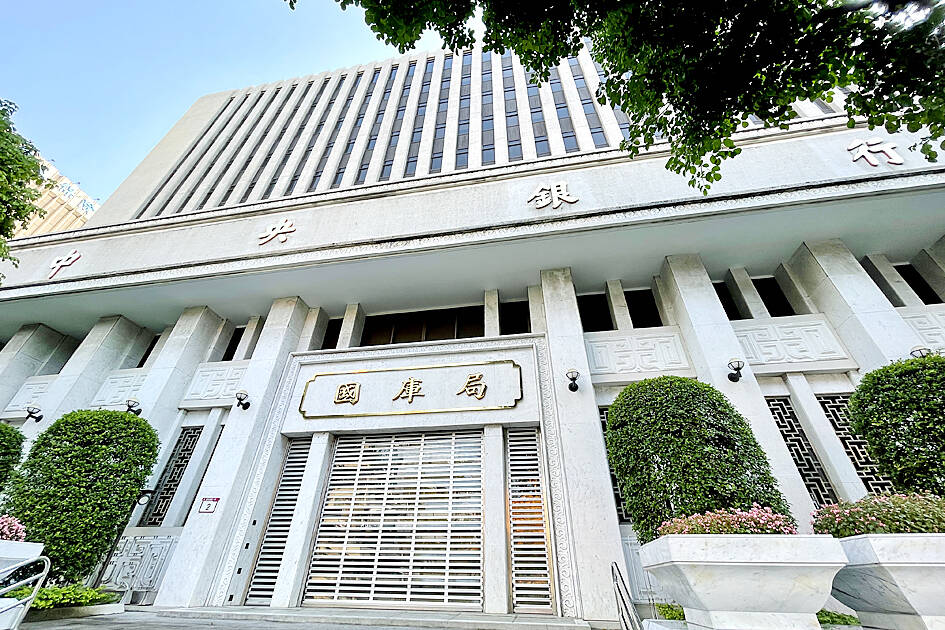The central bank would likely hike key interest rates by 12.5 basis points (bp) on Thursday amid slowing inflation, economists said.
The bank is expected to be less aggressive than the US Federal Reserve, as the inflation rate in Taiwan last month rose 2.66 percent, the lowest since February’s 2.33 percent, Taiwan Academy of Banking and Finance (台灣金融研訓院) economist Jerry Lin (林士傑) said.
Local consumer prices could further stabilize this year as the prices of industrial and agricultural goods decline on the global market, the Directorate-General of Budget, Accounting and Statistics has said.

Photo: George Tsorng, Taipei Times
The Fed is expected to raise key interest rates by 75 basis points following a Federal Open Market Committee meeting that is to end on Wednesday, Lin said.
The Fed’s continued hawkish approach is an attempt to quell skyrocketing inflation in the US, which reached 8.3 percent last month, beating market expectations of 8.1 percent growth, Lin said.
Lin said Taiwan’s central bank might take additional anti-inflationary measures, such as a 25-basis-point increase to the required deposit reserve ratio, which is the fraction of deposits regulators require banks to hold in reserves, and not lend.
At its June meeting, the central bank raised interest rates by 12.5 basis points, with a discount rate of 1.5 percent, and also hiked the required deposit reserve ratio by 25 basis points to reduce liquidity on the market.
Since starting a rate hike cycle in March, the Fed has raised interest rates by 225 basis points, while Taiwan’s central bank has only increased rates by 37.5 basis points.
Lin said if Taiwan’s inflation continues to moderate, the central bank might leave interest rates unchanged at a quarterly policymaking meeting in December.
However, a 12.5-basis-point hike would be possible in December if consumer prices continue to rise, he added.
Chung-Hua Institution for Economic Research (中華經濟研究院) vice president Wang Jiann-chyuan (王健全) said he also expects the central bank to raise rates by 12.5 basis points this week.
However, Wang added that the widening rate gap between Taiwan and the US could create problems for the local central bank by driving foreign funds out of Taiwan.
On Friday, continued fund outflows driven by expectations of an aggressive Fed hike boosted the US dollar, which rose NT$0.163 against the New Taiwan dollar to NT$31.293, its highest level since NT$31.365 recorded on Sept. 4, 2019.
Taiwan Institute of Economic Research (台灣經濟研究院) economist Wu Meng-tao (吳孟道) said Taiwan’s relatively small and export-orientated economy means the central bank is unlikely to act as aggressively as the Fed.
Fubon Financial Holding Co (富邦金控) chief economist Rick Lo (羅瑋) said the Fed is likely to raise rates by 50 basis points in November and 25 basis points in December following an expected 75-basis-point hike this month.
Lo said a December hike would signal the end of Fed’s rate hike cycle for this year, which would see it raise key interest rates by 375 basis points.
A more hawkish approach could hurt the US economy and have an adverse effect on other economies, Lo said.

UNCERTAINTY: Innolux activated a stringent supply chain management mechanism, as it did during the COVID-19 pandemic, to ensure optimal inventory levels for customers Flat-panel display makers AUO Corp (友達) and Innolux Corp (群創) yesterday said that about 12 to 20 percent of their display business is at risk of potential US tariffs and that they would relocate production or shipment destinations to mitigate the levies’ effects. US tariffs would have a direct impact of US$200 million on AUO’s revenue, company chairman Paul Peng (彭雙浪) told reporters on the sidelines of the Touch Taiwan trade show in Taipei yesterday. That would make up about 12 percent of the company’s overall revenue. To cope with the tariff uncertainty, AUO plans to allocate its production to manufacturing facilities in

Taiwan will prioritize the development of silicon photonics by taking advantage of its strength in the semiconductor industry to build another shield to protect the local economy, National Development Council (NDC) Minister Paul Liu (劉鏡清) said yesterday. Speaking at a meeting of the legislature’s Economics Committee, Liu said Taiwan already has the artificial intelligence (AI) industry as a shield, after the semiconductor industry, to safeguard the country, and is looking at new unique fields to build more economic shields. While Taiwan will further strengthen its existing shields, over the longer term, the country is determined to focus on such potential segments as

TAKING STOCK: A Taiwanese cookware firm in Vietnam urged customers to assess inventory or place orders early so shipments can reach the US while tariffs are paused Taiwanese businesses in Vietnam are exploring alternatives after the White House imposed a 46 percent import duty on Vietnamese goods, following US President Donald Trump’s announcement of “reciprocal” tariffs on the US’ trading partners. Lo Shih-liang (羅世良), chairman of Brico Industry Co (裕茂工業), a Taiwanese company that manufactures cast iron cookware and stove components in Vietnam, said that more than 40 percent of his business was tied to the US market, describing the constant US policy shifts as an emotional roller coaster. “I work during the day and stay up all night watching the news. I’ve been following US news until 3am

COLLABORATION: Given Taiwan’s key position in global supply chains, the US firm is discussing strategies with local partners and clients to deal with global uncertainties Advanced Micro Devices Inc (AMD) yesterday said it is meeting with local ecosystem partners, including Taiwan Semiconductor Manufacturing Co (TSMC, 台積電), to discuss strategies, including long-term manufacturing, to navigate uncertainties such as US tariffs, as Taiwan occupies an important position in global supply chains. AMD chief executive officer Lisa Su (蘇姿丰) told reporters that Taiwan is an important part of the chip designer’s ecosystem and she is discussing with partners and customers in Taiwan to forge strong collaborations on different areas during this critical period. AMD has just become the first artificial-intelligence (AI) server chip customer of TSMC to utilize its advanced